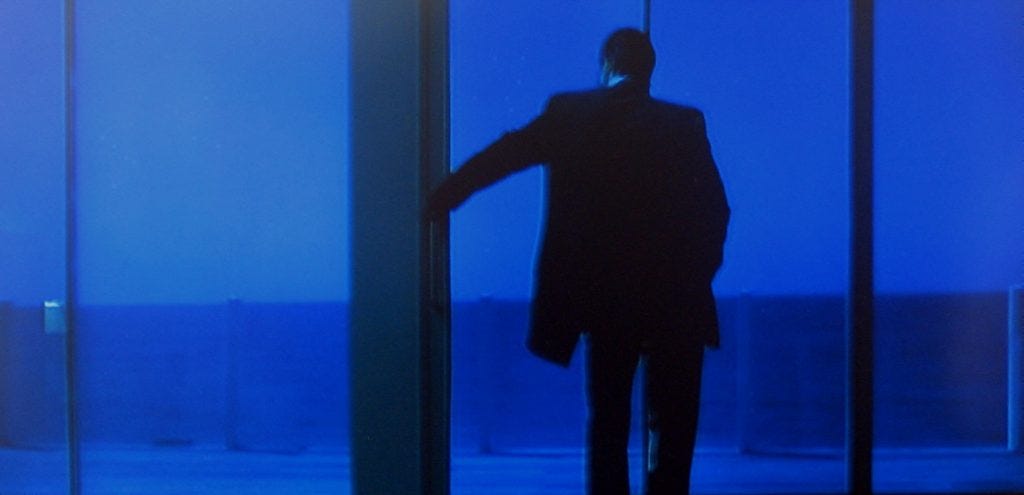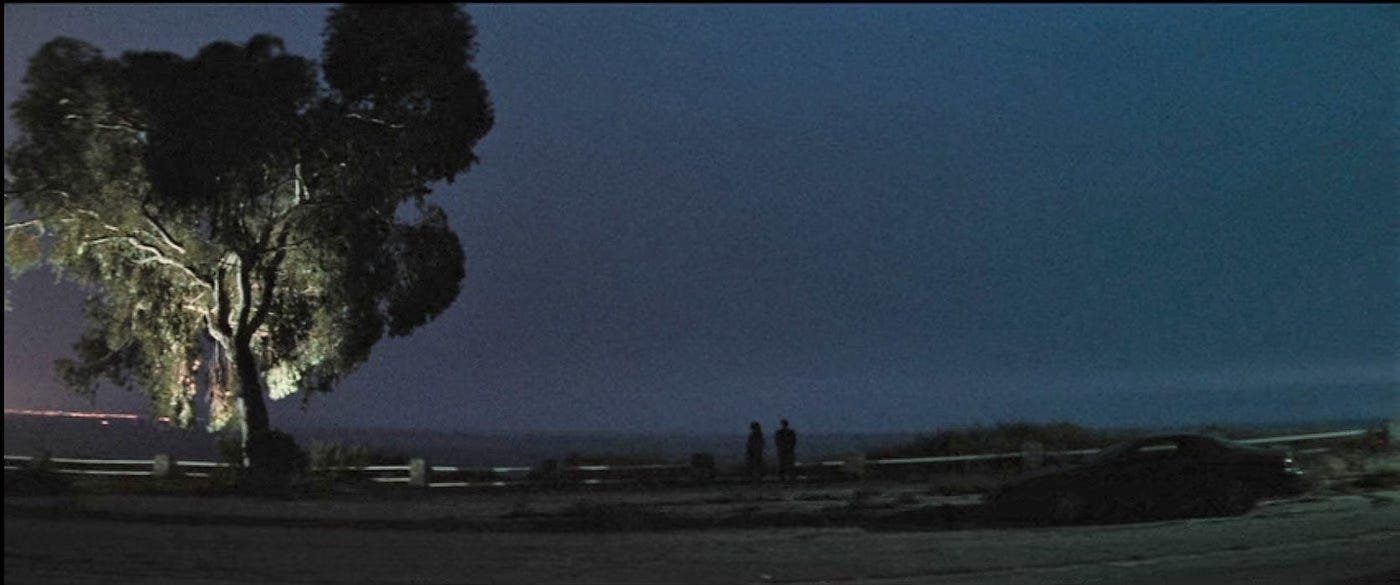Versions of this appeared in Newcity (1995) and Cinema Scope (2000).
Heat is a love story, a story about what men will die for and what they believe they live for. It is about the sordid bloom of the sprawl called Los Angeles, the color of dusk and twilight across an unnaturally brilliant, sanguine desert and a sadness you would not want to put a name to for fear of lacking the language. There are cops and there are crooks and there are the women they try to love and the women who try to love them back. There are also things called good and evil, but no one truly ever talks about them. They move forward, letting their actions represent their life-learned morality. Mostly there are the pale shadows that flicker in Southern California just before dark: are we as real as the shimmering light, are we as unreal as the plans we make for ourselves and the steps we take to realize them?
Writer-director Michael Mann's inspiringly rich movie traffics in the crack action, terse dialogue and lush imagery of modernist thriller, but his touch has grown increasingly masterful, and rise far above the glossy promise of Manhunter and The Last of the Mohicans. (Who else would be so foolish as to make a procedural about failed romance?) Heat is 170 minutes long yet almost never flags. As Mann's large cast of primary characters—workaholics all—cling desperately to whatever sense of purpose they've managed to construct for their actions, his telling is pellucid, lapidary, patient, unapologetic. This is the way we live today, Mann convincingly argues, as well as lie, cry, fight, love, fuck, fuck up, say hello when we shouldn't and fail to say good-bye when we should. Mann surveys the damage, and while the pictures are pretty, no one stops to drink them in.
There's only room to take in a few square inches of Mann's richly textured canvas: A woman watches a man in a bookstore. The man hunches at a counter to tend a solitary meal in Santa Monica's Broadway Deli. The fixtures and clientele are equally stylish and sober. The bookstore clerk takes a place near him, casual and cool, asks him questions. He's not used to this; he’s annoyed by this rupture in his illusion that he is invisible to the world he moves through, kept from keeping tabs on a cup of coffee and poring over his fresh purchase, "Stress Fractures in Titanium."
Exquisite irony. The hairlines he can exploit, but with this woman, he's lost—lost to her long curls and her slow drawl and her languid smile of potential interest. Doesn't know how to play games. Isn't strategic. The formulas he follows as a high-line thief do not obtain. Women are not formulas, cannot be charted. Later that night, the pair stand on the deck of her Hollywood Hills home. He is a crook who wants to escape to New Zealand with an idealized woman. She is an aspiring graphic artist who wants to fathom this taciturn man. They look at each other with respect and curiosity and longing.
As they swap compressed morsels of their pasts, Mann alternates severely composed widescreen images of their profiles against a sunset striated by deep crimson, slate and khaki green, a patently artificial rear projection that elevates their banal exchange into purest melancholy, as they consider the intersection of their lives—the lives of each person—underneath the coral-colored streetlights that twinkle across the desert basin.
Homicide detective Al Pacino enters the story, yet the script follows the details of each man's disastrous personal life. Pacino's on his third marriage, and frustrated wife Diane Venora, improbably philosophical in the face of Pacino's fidelity to his job, grows farther and farther from him. "There is no use talking to you," this earthy Audrey Hepburn sighs to Pacino. "All you are is a child grown older." Another time: "What I don't understand is why I can't cut loose of you." That's the mystery less fathomable than right and wrong: What the heart wants, and why. Mann's script isn't just rife with raging hard-ons, it's not a patch of veiled homoerotic bonding. This is not Tarantino's mulligatawny, but a world of hurt.
Harsh and romantic, visually magnificent yet tongue-tied, this is the world of the men and women, the cops and robbers, the crooks and lovers who populate Mann's L.A., unutterable beauty and vicious banality slumbering side-by-side. There is a plot over which the impasto of sober mood is applied; it crackles from the first action scene, a commando heist of impeccable precision. DeNiro and his gang (including Val Kilmer and Tom Sizemore) knock over an armored car in downtown L.A. and a trigger-happy cohort blows away three guards.
The scene is as viscerally color-coded as anything since John Boorman's magnificent L.A. gangster canvas, Point Blank, against desert-parched backdrops perfervid with yellow, seafoam green and mango a woman's red dress in a rearview mirror prompts a cut; a green freeway on-ramp sign is splotched with bright red graffiti; the robbery is pulled off in an orange ambulance and a massive green tow truck; a television in a bum's shopping cart buzzes with fluffy pink static. (Steven Soderbergh may never have seen Heat, but The Limey is equally comfortable with the illusory desert beauty of California's Southland.) As in The Insider, Mann demonstrates that the world is a dream but it is a place where you can suddenly awaken to new realities.
Mann even sits the cop and the crook down for coffee, proffering Pacino and DeNiro at their best, alive to the potential of a Western showdown, both between characters and two legendary actors. There's a climactic showdown as well, a cat-and-mouse game between the runways at LAX, at first seeming monstrously overdone. But finally, it comes clear as the pair enact a mano-a-mano in a no-man's-land, a void of coming and going, a place in between other places, between darkness and light, between words and images, between certitude and confusion, between a bullet and a wound. Men adrift, clinging to their identities as policemen, or as crooks, or as husbands and lovers. Clinging. Something to provide identity. Something to preserve identity. The staccato of breath caught in the back of the throat-have I been caught out yet? Does the world know how little I know? Have I met my match in this adversary? In this woman? Am I outclassed?
Poetry.






